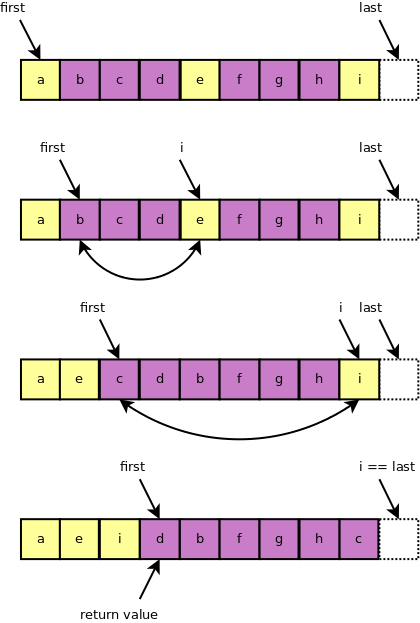Partition basics
Partitioning a range
Introduction
We’re going to have a look at a range partition. We’ve got a range and a unary predicate. We’d like to rearrange the values such as the they are grouped into two ranges based on the result of the predicate.
That’s similar to std::partition from the standard C++ library with some
differences.
See the article on min as to why and comments below.
1
2
3
4
5
6
7
8
9
10
11
12
13
14
15
16
17
18
19
20
21
namespace algs {
// generalized semistable partition forward taking predicate and projection
template<typename I, typename S, typename Pred, typename Proj>
// requires I is an ForwardIterator,
// S is a sentinel for I,
// Pred is an unary predicate on projection Proj of ValueType(I)
I partition_semistable(I f, S l, Pred pred, Proj proj) {
f = algs::find_if(f, l, pred, proj);
if (f == l) return f;
for (I i = std::next(f); i != l; ++i) {
if(!pred(std::invoke(proj, *i))) {
std::iter_swap(f, i);
++f;
}
}
return f;
}
// ... less general options implemented in terms of the above
}
The rest of the article is about how did we get there.
Basic usage
Basic usage of partition_semistable looks like this:
1
2
3
4
5
6
7
8
9
10
11
12
13
14
15
16
17
18
19
std::vector<char> v{'a', 'b', 'c', 'd', 'e', 'f', 'g', 'h', 'i'};
auto is_consonant = [](char x) {
switch(x) {
case 'a': case 'e': case 'i': case 'o': case 'u': return false;
default: return true;
}
};
auto pr = algs::range::partition_semistable(v, is_consonant);
for (auto c : v) {
std::cout << c; // Prints aeidbfghc
}
std::cout << '\n';
if (pr == v.end()) {
std::cout << "FAIL!\n"; // we know we have consonants
}
std::cout << *pr << '\n'; // Prints d
How it works

Which range first
This implementation is different from std::partition in that the range is
partitioned so that the values for which the predicate returns false preceed
the values for which the predicate returns true. It makes better sense when
thinking about similar functions where the paritioning function returns more
than two values (say -1, 0 or 1 for a three way partitioning).
Algorithmic complexity
The function takes O(n) predicate applications, precisely one for each element in the
range (unless predicate or projection throws).
Stability
partition_semistable is partially stable in that it preserves the order of the
values for which the predicate returns false, but does not preserve the order
of the values for which the predicate retrns true.
Other related algorithms make different choices.
One choice is to not give any stability guarantees. That’s what
std::partition does. For bidirectional iterators there is an algorithm that
has fewer swaps, but gives up any stability guarantees. A function like
partition would map to the appropriate one for the iterator type.
If the data is stored in a linked list, an algorithm partition_linked that is
stable is possible by traversing the list, splitting and re-linking the nodes
into two chains based on the predicate.
Another choice is to provide stability guarantees for all the values in the
sequence, at the cost of more work or space. That’s what stable_partition does.
Pseudo predicate
When the predicate is only applied once it does not need to be a regular function it can be just a pseudopredicate: it has the signature of a predicate, but it’s not regular (a regular function consistently returns the same results for the same values). For example the sequence can contain HTTP URLs and it can be partitioned based on a pseudo-predicate that downloads from the URLs and checks if the download time is less than 200ms.
Another choice is to implement partition_postion and
stable_partition_position that pass to the predicate the iterator (position)
instead of the refrence to the value. Such a predicate could use the iterator
(position) to calculate an offset in another sequence and use a pre-computed
result, also taking advantage that the predicate is only applied once, for the
item in the origial position.
Theoretically some algorithms could choose to remove the guarantee that the predicate is applied only once for each value.
Related algorithms
partition_point(find the partition point, assuming input is partitioned)partition(no stability guarantees, predicate applied once)stable_partition(partition, but stable, higher algorithmic complexity)partition_linked(stable partition for linked lists/iterators)partition_position,stable_partition_position(variants that supply the iterator to the predicate)sort(sorts values)
References
- Elements of Programming (book by Alexander A. Stepanov and Paul McJones)
- Better Code: Human Interface by Sean Parent: showing recursive stable_partition and stable_partition_position
- Article on implementing min, followed by linear find and swap